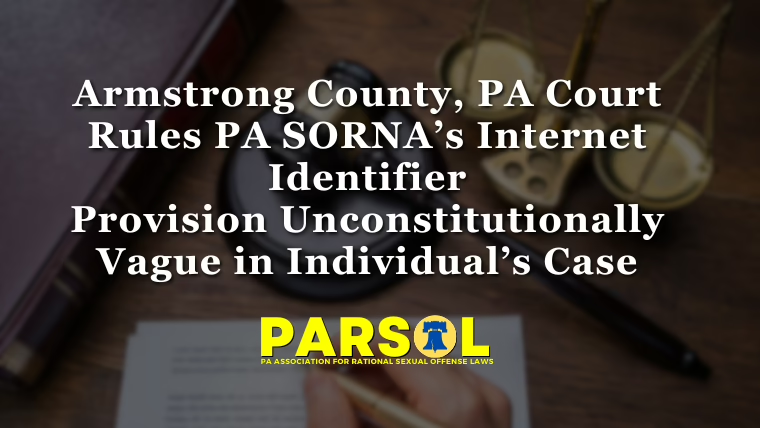PARSOL Legislative Director Randall Hayes and Managing Director John Dawe were joined on Capitol Hill in Harrisburg, PA on Tuesday, April 30, 2024 by eight additional PARSOL volunteers from across the state. We met with dozens of Senators, Representatives, and Senate and House employees about rational reform measures to protect our communities and families from harm.
Here are our current legislative asks:
The Pennsylvania Association for Rational Sexual Offense Laws (PARSOL) believes all sexual abuse is unacceptable and that prevention, treatment, and healing are possible. We take a person-first approach to criminal justice reform that cultivates a fair and just society, honors inherent dignity and promotes respect and fairness. People can and do change. As such, PARSOL advocates for sexual offense public safety measures and resources that work for all through prevention-based, trauma-and-treatment-informed, and healing-focused legislative and public policy initiatives that respect our Constitution and all people’s dignity.
We share responsibility for each other and for the common good. We all grow and change over time and need a chance to start over when things go wrong. To foster redemption, we must provide conditions that allow people to develop, rebuild, and reclaim full responsibility for their lives. For persons with a history of criminal sexual behavior, that includes coming to terms with their past actions and ensuring safeguards are in place to not re-offend. Yet, our constituents are faced with misleading, inaccurate, and untruthful statements about themselves on a daily basis, which stand in the way of progress and even, at times, basic human needs. Therefore, we ask all legislators to agree to the following requests.
Recognize sexual harm is preventable as a public health issue, not a criminal justice response.
- Decades of research since the implementation of the ‘Sex Offender’ Registry shows it doesn’t work and likely causes more harm than good.
- The latest Pennsylvania research from 2022 by the PA Department of Corrections showed that effective housing, employment, and community involvement were key to preventing recidivism, yet Nine out of 10 respondents to a 2023 PARSOL survey stated that their registration and supervision restrictions were significant barriers to housing, employment, and community involvement.
- Research by the Joint Commission and the HEAL PA initiative show that prevention and trauma-informed treatment for both perpetrators and survivors of sexual abuse is far more effective.
- The Association for the Treatment of Sexual Abusers (ATSA) published a study in 2020 that stated that, “The research to date on SORN[A] has not identified significant reductions in the incidence of sexual abuse or sexual offense recidivism as a result of this policy. Current practices have numerous unintended consequences that potentially increase, rather than decrease, risk factors for individuals required to register. If the goals of these laws are the prevention of sexual abuse and reducing recidivism risk, meaningful legislative reforms will be required.”
Base upcoming legislation and policy on evidence-based solutions
- In Comm. v. Torsilieri, a case currently before the Supreme Court of Pennsylvania, the defendant challenged the constitutionality of Pennsylvania’s Sex Offender Registration and Notification Act (SORNA) and was successful at the Common Pleas level. If SCOPA upholds any or all of the lower court decisions, it will likely fall upon the legislature to enact yet another version of the ‘registry’ law for the sixth time.
- This presents a major opportunity for legislators who base their policies and votes on facts and data (instead of fears, myths, and public misinformation) to make meaningful, evidence-based policies and laws. The American Law Institute recommendations are helpful here.
- Legislators can do this by attending and participating in Judiciary Committee hearings on any upcoming sexual offense legislation, pushing for evidence-based expert testimony from experts in the field of treatment of sexual offending, reoffense/recidivism rates, and registry impact. Avoid fear-based rhetoric around ‘frightening and high’ recidivism rates and look at real data from PCCD & other experts.
- Pennsylvania Department of Corrections and Pennsylvania Commission on Crime and Delinquency data shows a recidivism rate for non-contact sexual offenses as having the lowest recidivism rate of all tracked crimes.
Stop Excluding Persons with Sex Crimes from Support
- Advocate against/amend legislation containing carveouts that exclude persons with crimes of a sexual nature from programs that enhance their ability to succeed.
- With the lowest recidivism rate of any other crime classification, exclusions of persons with crimes of a sexual nature in public policy and/or legislative action is unfair and unjust.
- Recent Examples:
- Act 44 of 2023 was a major probation reform bill that minimizes punishments for technical probation violations and allows judges to shorten probation time for good behavior or for completing certain programs.
- It should be noted that a recent study by the PA Commission on Crime and Delinquency showed that reentrants with crimes involving child sexual abuse materials had an extremely low 4.3% reoccurrence rate and that 56% of rearrests were due to registry-related technical violations.
- Terminology Clarification: The reoccurrence rate differs from the recidivism rate by only including sexual offenses or sex offense registry-related reasons.
- House Bill 1678 of this session allows the PA parole board to consider people who are proactively participating in educational, trade, and treatment programs sooner and to actively consider the attainment of earned vocational training and education credit in parole decisions.
- Sadly, both of these bills reference the registry law and excludes/disqualifies based on: ‘an offense listed under Subchapter H (relating to registration of sexual offenders) or I (relating to continued registration of sexual offenders).’
- Act 44 of 2023 was a major probation reform bill that minimizes punishments for technical probation violations and allows judges to shorten probation time for good behavior or for completing certain programs.
Support Trauma-Informed PA (“HEAL PA”) to include those with sexual offenses & survivors of sexual trauma.
- Support and fund trauma-informed behavioral health treatment programs for compulsive, maladaptive sexual behaviors and sexual addiction commensurate with substance use disorder.
- Support the Trauma-Informed PA initiative, “HEAL PA,” which calls for Pennsylvania to fund comprehensive programs to build resilience in schools and communities and fund treatment programs, including identifying both those at high risk for engaging in illegal sexual behaviors and those children at risk of sexual exploitation, based on static and dynamic factors such as their Adverse Childhood Experiences (ACE) assessment score.
- Support age-appropriate education around sexuality and healthy relationships, including consent, signs of grooming, and reporting suspicious and inappropriate actions.
Use Current & Person-First Terminology
- Learn and use person-first and best practices-based terminology around persons with sexual offenses and sexual offending behaviors.
- Avoid “sex offender,” instead using “person who has offended sexually” or “persons with crimes of a sexual nature.” If using the term to refer to something official, put it in quotes as the ‘Sex Offender’ Registry.
- Avoid “child pornography” and use “child sexual abuse material,” commensurate with the PA Task Force on Child Pornography’s recommendations.
- Avoid “sexual abuse/violence victim” and use “survivor of sexual abuse/violence” or “person who has experienced sexual abuse.”
- See also: HEAL PA Definitions page




![stuckIn1995_rally_header - PARSOL - Pennsylvania Assoc for Rational Sex Offense Laws (PA Megan's Law Resources) PARSOL Board Chair Josiah Krammes speaks at the PA Capitol Rotunda flanked by State Reps. Emily Kinkead and Tim Briggs (28 Oct 2025) [John Dawe/PARSOL]](https://parsol.org/wp-content/uploads/2025/10/stuckIn1995_rally_header.avif)